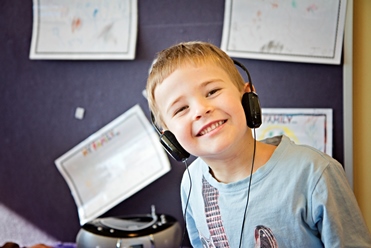 New Charles Sturt University
(CSU) research has found that parents were more likely to identify common speech disorders in young children than teachers.
New Charles Sturt University
(CSU) research has found that parents were more likely to identify common speech disorders in young children than teachers.
Published in the Australasian Journal of Learning Difficulties, the study into speech sound disorders (SSD) involved a sample of 157 children aged four to five years in preschools and long day care centres in both Victoria and NSW.
The research examined parent reports, teacher reports and the clinical assessments of a speech pathologist. Children were asked to label a series of 50 pictures and their speech was transcribed.
The research found that most parents viewed early childhood teachers as a 'primary source' for advice on their child's development yet a third of these early childhood teachers missed identifying children with speech sound disorders.
CSU Professor of Speech and Language Acquisition, Sharynne McLeod from the School of Teacher Education, said, "It's well known that SSD typically presents in early childhood and can have long-term consequences if not identified and addressed during those early years.
"If unresolved prior to entering school or in the early years of school, SSD may be associated with ongoing difficulties with communication and social interactions but also difficulties with literacy and academic performance.
"Early and timely intervention can effectively address childhood SSD and minimise the likelihood of ongoing difficulties.
"However early intervention requires early and appropriate identification of concern about a child's speech."
"We found that 88 per cent of parents who thought their child had a speech difficulty were accurate compared with teachers who were 71 per cent correct. The study also found that teachers in Victoria were more likely to identify children as having speech concern than teachers in NSW.
"The study supports the view that the judgements of parents are valid and provide a strong basis for defining and diagnosing speech difficulties," Professor McLeod said.
There are a variety of reasons why parents and teachers would have different views on a child's speech development.
Teachers may focus on a child's strengths rather than label the child has having a problem; there may be insufficient pre-service training for teachers in their undergraduate early childhood courses; and limited availability of on-going professional development and access to information about children's speech.
Professor McLeod said, "Previous research has shown that parents often wait for a recommendation from their early childhood educator to seek treatment from a speech pathologist and this may delay access to early intervention.
"Parents should be encouraged to recognise the legitimacy of their concerns and to follow-up with speech pathologists when speech and language concerns first become apparent in children.
"It is also important that early childhood teachers not dismiss parental concerns but provide an informed response particularly in relation to the availability of speech pathology services.
"Parents who have concerns about their child's communications skills should contact a speech pathologist."
The Speech Pathology Australia website has facts sheets here: www.speechpathologyaustralia.org.au/factsheets and a 'Find a Speech Pathologist' link here: www.speechpathologyaustralia.org.au/find





Social
Explore the world of social